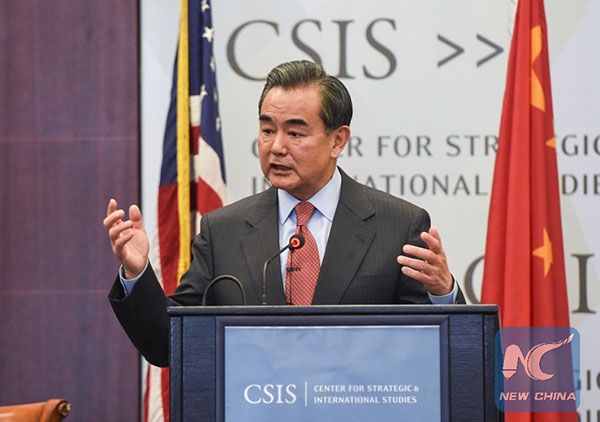THAAD deployment in ROK may threaten China's security interests
(Xinhua) Updated: 2016-02-26 09:18
 |
|
Chinese Foreign Minister Wang Yi speaks during a discussion on Chinese foreign policy and China-US Relations at Center for Strategic and International Studies(CSIS) in Washington D.C., the United States, on Feb 25, 2016. [Photo/Xinhua] |
WASHINGTON - The deployment of the Terminal High Altitude Area Defense (THAAD), an advanced US missile defense system, in the Republic of Korea (ROK) may impair, or even threaten China's security interests, visiting Chinese Foreign Minister Wang Yi said here Thursday.
The range of X-band radar associated with the THAAD system goes far beyond the Korean Peninsular and well into the interior of China, the Chinese minister said in a speech at the Center for Strategic and International Studies, a Washington-based think tank.
"We believe China's legitimate security concerns must be taken into account" as the US and ROK discuss the deployment of the defense system, he said.
"A convincing explanation must be provided to China," the top Chinese diplomat said. "I don't think it's too much to ask. It's a reasonable position."
The United States and the ROK started talks on THAAD after the Democratic People's Republic of Korea (DPRK) conducted its fourth nuclear test on Jan 6 and allegedly launched an Earth-observation satellite to test ballistic missile technology on Feb 7 this year.
In his speech, Wang reiterated China's principle of the denuclearization of the Korean Peninsula and the realization of the goal through negotiations.
He said that Beijing and Washington have "far more common interests than areas of disagreement," adding that the two sides should boost strategic mutual trust, deepen practical cooperation and constructively manage differences to achieve greater progress in bilateral ties.
Developing a strong China-US relationship is in the interests of both sides and is in accordance with the aspirations of the international community, he said.
The Chinese foreign minister, who arrived here Tuesday for a three-day official visit, also held meetings with US President Barack Obama and US National Security Advisor Susan Rice on Wednesday.






